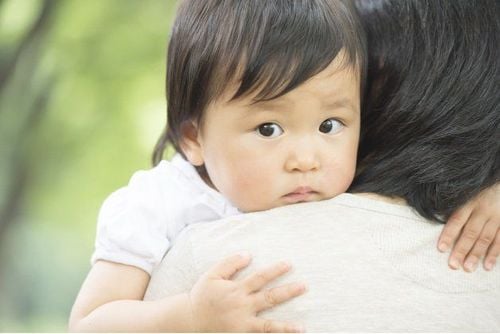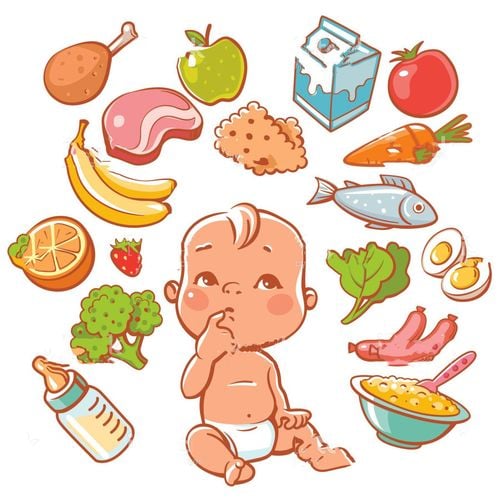This is an automatically translated article.
According to experts, children's happiness is not brought about by their parents, but by their upbringing. Children who are over-indulged, full of toys and never upset, are more likely to become bored, cynical, and unhappy. So how to raise happy children?1. Learn to read your child's emotions
When your baby is an infant and toddler, you can tell if he's happy or sad. Baby's face lights up in a big smile when you get home, and sobs incessantly when his favorite toy breaks down.But as your child gets older, emotions also become more complex with self-control and growing stronger. However, the outward signs that your child is happy or unhappy are also quite recognizable. A happy child will happily smile, play, show curiosity, get along with friends.
On the contrary, the signs of an unhappy child are very clear: The child is withdrawn, does not talk much, does not eat much, does not naturally mingle with friends, does not play, does not ask questions, does not smile, and say nonsense.
If your child is a naturally shy or introverted child who doesn't smile or interact much, it doesn't mean he's unhappy. Shyness isn't the same as sadness, but it will take more effort to read your baby's cues. It is important to detect major changes in your child's behavior, such as becoming more isolated or fearful. This could be a sign that your child has a problem that deserves attention.
A professor of psychiatry has identified 9 innate "signals" that children use to communicate their feelings. In which, there are positive signals such as "concern" and "interest", whereas negative signals such as "distress", "anger" and "fear" show that the baby is not happy.
Most parents realize that a child who is easily frightened or upset will not enjoy crowded extracurricular activities, but what parents do not know is that an angry child often displays sadness. According to psychologists, regardless of age, anger is simply excessive worry. When your child hits a sibling or screams "I hate you!", it means he's suffering so much that he can't express it through normal communication.
Children will have their own ways of expressing themselves in the face of difficult times. Some children may give up, others go on a rampage, and still others cling close to their mother. When you know your child's temperament, you will be able to spot signs that something is wrong with your child.

Khi con còn là một đứa trẻ sơ sinh và mới biết đi, bạn có thể biết rõ con đang vui hay buồn
2. Play happily with children
If you ask your child about his happiest times, he will probably say that the thing that makes him happiest is you. Parents are the first key that opens the door to happiness for children. Experts recommend bonding with your child, playing with him. If you are having fun with your child, your child will be happy too. Creating a family-friendly childhood is the best step to ensuring a happy parenting.Play activities not only create fun, but also help children develop necessary skills, building happiness in the future. Free play helps children discover their own interests - like building a city from Lego blocks, pretending to be a teacher teaching stuffed animals. This can be the beginning of interests that are nurtured and last a lifetime.
3. Help your child master new skills
The surprising thing is: Happy people are often the ones who have mastered a skill. Like adults, a happy child needs to pursue his or her own interests, or else there will be no joy in being successful. For example, when your child learns to catch a ball, he will learn from his mistakes, develop perseverance and discipline. Then you will experience the joy of success from your own efforts.Children also reap the rewards of recognition from others for their achievements. Most importantly, children will discover that they have some control over their lives: If they try to do something, with persistence, eventually they will succeed. This is also an important factor in determining adult happiness.

Một đứa trẻ hạnh phúc cần phải theo đuổi sở thích của riêng mình, nếu không sẽ không có niềm vui khi thành công
4. Cultivate healthy habits
Getting plenty of sleep, exercise, and a healthy diet are important for everyone's health, especially children. To exercise, your child doesn't have to join a soccer team, just running around outside is enough to relieve the mood.If you want to feed your baby properly, you should also pay attention to the link between your child's mood and specific foods. For example, sugar can give kids an energy boost, but it also creates a drop in energy when the sugar wears off. Food allergies and sensitivities can also play a role in shaping a child's behavior and mood.
5. Let your child experience
Sometimes parents think that in order to raise happy children, we need to try our best to solve all the problems that children face in life. But child psychologists consider this to be a big mistake that many overly loving parents make unintentionally.Parents who are always trying to make things better for their children, making them happy all the time is not ideal. Do not always intervene and try to solve all problems for the child. Children need to learn to endure some suffering and unhappiness. Let them fight on their own, figure things out and learn to cope.
Children should be allowed to experience many situations, even difficulties or disappointments, to build inner strength and lead to happiness. Whether it's a 7-month-old trying to crawl or a 7-year-old struggling with math problems, eventually your baby will get better at dealing with simple adversity over and over again.
Learning to deal with the inevitable disappointments and failures in life is very important for your child's future happiness. Over time, children will learn that no matter what happens, they can find a solution. This does not mean that parents should not help their children when needed. But your role is to show your child the solution, not do it for him.

Nên cho phép trẻ em trải nghiệm nhiều tình huống, ngay cả những khó khăn hoặc thất vọng, để xây dựng nguồn sức mạnh bên trong và dẫn đến hạnh phúc
6. Allow the child to be sad or angry
When your child appears bored, ducking into a corner at a birthday party, your natural reaction might be to say, "You should be as happy as everyone else!". There are also some parents who feel overwhelming anxiety whenever their little one is rejected, not invited to a friend's birthday party, or every time he cries because he didn't get what he wanted.Children need to know that it's okay to be upset sometimes, it's just part of life. If you try to suppress all the unhappiness, your baby may understand that feeling sad is wrong. Let your child experience every true feeling, including sadness.
Instead of squeezing inward, encourage your child to express his feelings verbally. Don't try to solve your child's problems, listen instead and help them find solutions.
For example, allow your child to say: "Mom, I'm so mad at you" or "I'm so sad that I can't go out today". At that time, parents can answer: "I'm sorry for making you upset" or "I'm sorry, also sad", and continue to talk with the child.
7. Listen to your child
The best and simplest advice to know if your child is happy is this: Listen. You can ask him directly if he is happy and see his reaction, or at least this is a way of showing you care.Open communication is essential to understanding your child's moods. For example, say to your child: “You seem sad. Is there anything you want to say to your mother? Is there anything that bothers you?" Then let your child tell you the story. If your child refuses to share, try again the next day.
If you are concerned that your child is facing a problem, try talking with the teacher, regular caregiver and other parents to see if any information is helpful.
Most of the times when a child is unhappy or upset is due to a stressful living environment: fighting with friends, quarreling with siblings or family discord. But sometimes the source of discontent is more serious.
If you see signs of unhappiness that cling to your child too much - like your child's reluctance to go to school every morning, worry about losing a parent, pretending to be sick, feeling sad all the time, trouble sleeping or eating - Talk to your doctor or consult a mental health professional who specializes in children. In general, depression in preschoolers is uncommon.

Giao tiếp cởi mở là điều cần thiết để hiểu được tâm trạng của con bạn
8. Teach children to care and share
Research shows that people who find meaning in life feel less depressed. And so are children. For example, helping mom with simple household chores, like getting clothes out of the dryer, will make your child feel good about contributing.Some families have the habit of charity and helping others also raise their children properly. For example, after a flood, you could help your child prepare school supplies and backpacks to donate to other children.
9. Be a role model for children
Research shows that parents can pass on their temperament to their children - not necessarily through genes, but rather their behavior and parenting style. The temperament of the child will depend on the mood of the parent. Even babies imitate their parents' emotional styles. When you smile, your baby smiles too, and their brain activates the nerves to smile.Proper parenting is about being a positive role model for your child from the little things. Teach your children to be happy for what they have, instead of being sad for what they don't have. One parent found that when they were under a lot of stress, their children reacted immediately by shutting themselves down and withdrawing. This makes parents need to work hard to show their children a more positive attitude to life.
But you don't have to hide your negative feelings either. You can show your child that you're upset because your best friend is moving away, and talk to them about how it's fun to stay in touch and visit each other. In this way, you teach your child that sadness is a part of life, and show him how to get over it.
True happiness comes from within, not without. Therefore, parents need to raise their children properly so that they become happy children. You don't have to be a child psychologist to give your child the inner strength and wisdom needed to navigate life's ups and downs. With patience and flexibility, any parent can raise a happy child for a lifetime.
For children to be healthy and develop well, it is necessary to have a nutritious diet in terms of quantity and quality balance. If children are not provided with adequate and balanced nutrients, it will lead to diseases of excess or lack of nutrients, which adversely affect the comprehensive development of children in terms of physical, mental and motor skills.
Parents should supplement their children with supportive products containing lysine, essential micro-minerals and vitamins such as zinc, chromium, selenium, and B vitamins to help fully meet their child's nutritional needs. At the same time, these essential vitamins also support digestion, enhance nutrient absorption, help improve anorexia, and help children eat well.
Parents can learn more:
Signs of zinc deficiency in children
Micronutrient deficiency and failure to gain weight in children
Please regularly visit Vinmec.com website and update useful information to take care of your child. Take care of the baby and the whole family.
Article referenced source: Babycenter.com













